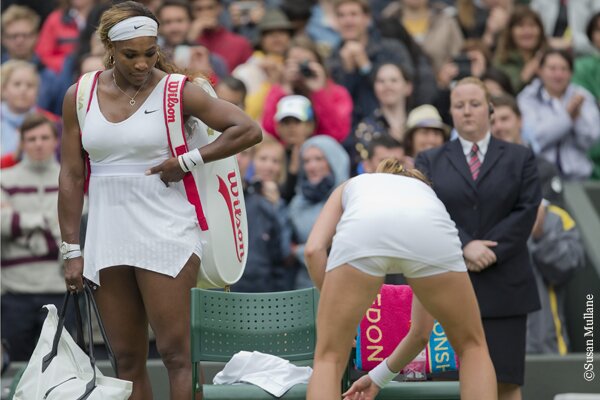By Alix Ramsay
It was the tap on the shoulder that told the story. When Serena Williams stood impatiently behind Alize Cornet, the lass who had just dumped her out of Wimbledon 1-6, 6-3, 6-4, she was clearly seething. The young Frenchwoman was lapping up the applause and sitting happily in chair, grinning from ear to ear. And then Serena tapped her on the shoulder. Come on, love, get on with it.
Standing with her hand on her hip, her bags over her shoulder, she looked like an angry mother chivvying her precocious, teenage daughter along. Come on, girl; I don’t have all day. Move yourself.
Wimbledon protocol dictates that the victor and the vanquished leave the court at the same time. None of this sulky storming off the minute the last expensive Championship towel has been stuffed in the kitbag. No, the loser must wait for the delighted winner to do her stuff, get herself together and walk away to cheers and adulation. But when Cornet prolonged the agony, Serena had had enough.
To be fair, Serena had had just about enough for the last two sets. From spending most of the day in the locker room waiting for the rain stop, she had come back to Court One and wrapped up the first set easily as Cornet struggled. But when the 24-year-old world No.24 settled down, she started taking it to the five-time champion, just as she had done in the Dubai semifinals back in February. She had a plan and she made it work.
“I just knew that I could do it because I did it once in Dubai, which is a big tournament in Dubai,” Cornet said, still revelling in what she had achieved. “I  thought, Okay, maybe it’s on grass, so it’s less easy. Definitely it helped me today, especially when I had to serve at 5‑4 in the third, because I had to do it already in Dubai at 5‑4 in the second set. I tried to stay calm as I did in Dubai and just to remain focused, focused on the simple things. Well, it’s amazing because beating Serena two times in a row, it doesn’t happen very often, so I’m glad.
thought, Okay, maybe it’s on grass, so it’s less easy. Definitely it helped me today, especially when I had to serve at 5‑4 in the third, because I had to do it already in Dubai at 5‑4 in the second set. I tried to stay calm as I did in Dubai and just to remain focused, focused on the simple things. Well, it’s amazing because beating Serena two times in a row, it doesn’t happen very often, so I’m glad.
“For me, it’s just being creative on the court, doing some dropshots, doing some variation with my topspin forehand. Trying to stay focused on the way I was moving on the court, I think it’s very important against Serena. Putting my first serve in.
“All these kind of things help me on the court to stay calm and know where I’m going actually, because otherwise Serena, she wouldn’t lose a single chance to make you feel that she is the boss on the court. I’m happy that I could hold it till the end.”
 Even when Serena tried to boss her off the court after the match, Cornet was not to be bossed. They walked off together, Serena leading the way with a face like thunder and then just as the Mighty One stepped through the barrier and off to the locker room, Cornet turned back to the crowd and punched the air in delight. Beating Serena once could be put down as a fluke; beating her twice in succession, the second time at Wimbledon of all places, was proof positive that Miss C had Miss W’s number.
Even when Serena tried to boss her off the court after the match, Cornet was not to be bossed. They walked off together, Serena leading the way with a face like thunder and then just as the Mighty One stepped through the barrier and off to the locker room, Cornet turned back to the crowd and punched the air in delight. Beating Serena once could be put down as a fluke; beating her twice in succession, the second time at Wimbledon of all places, was proof positive that Miss C had Miss W’s number.
It was Serena’s third grand slam wash-out this year and she was at a loss to explain what had gone wrong. The Australian and French Open upsets had been hard enough to swallow but at least she knew why she had lost; losing to Cornet on grass had her stumped. And it clearly hurt.
“Australia, I just couldn’t play,” she said simply. “And Paris I played really bad. Here I actually thought I played better. I came into the tournament in better form. You know, I thought I was doing pretty decent. I think I’m going to have to watch this film and see what I can do better and what went wrong.
“I thought my first two matches I served well. Today, I don’t know the percentages of my serve, but I do know I didn’t hit as many aces. I think my first serve was down a little bit. I worked really hard on my serve, so I don’t know why it didn’t happen today.”
All she does know is that the younger players seem to play better against her. Those of her own generation – of whom there are precious few left; Serena is now an elderly 32 – still hold her in awe but the new wave of talented hopefuls think of her as a target.
“If I’m not playing, you know, a great, great match, these girls when they play me, they play as if they’re on the ATP Tour, and then they play other girls completely different,” she said. “It’s never easy, you know, being in my shoes. But you got to be ready.”
And just to make sure everyone understood what she meant, she repeated herself.
“Against me,” she said again. “Yes, against me. I want to emphasise: against me.”
 But that is the way of professional sport. If the law of the jungle is unforgiving, the laws of professional sport are positively brutal. Serena is still a mighty player but she can never let her guard drop for a moment. Where once, a few years ago, no dared to take her on now she sees herds of new faces circling around her, wondering when they can make their move.
But that is the way of professional sport. If the law of the jungle is unforgiving, the laws of professional sport are positively brutal. Serena is still a mighty player but she can never let her guard drop for a moment. Where once, a few years ago, no dared to take her on now she sees herds of new faces circling around her, wondering when they can make their move.
Cornet, who is in the in-between generation, neither young nor properly established, must now face Genie Bouchard on Manic Monday. And Bouchard is being tipped as Maria Sharapova’s natural successor. Then there is Simona Halep who may not like the grass courts of SW19 too much but who is battling as only she can to get the hang of them. Bouchard pushed Sharapova hard at Roland Garros and Halep came within a whisker of beating Shazza in the French Open final. Shaz knows the young ones are ready to take over at the top.
For Serena, that realisation is taking a while to sink in. If she had to work hard to achieve all she did last year, she must now work three times as hard to stand a chance of doing it again. The old guard may not have changed just yet but the new troops are busy square bashing on the parade ground. Their time is fast approaching.



 29 Jun 2014
29 Jun 2014  Posted by Alix
Posted by Alix
